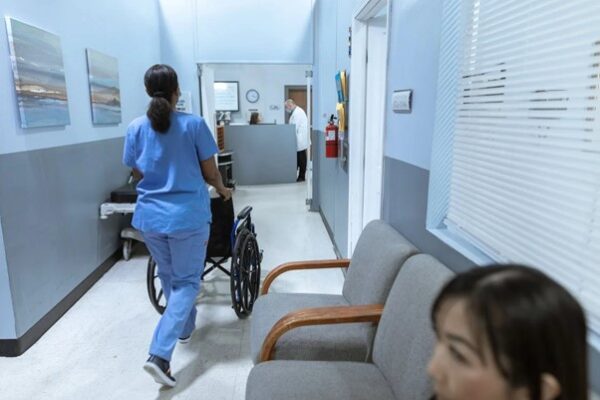Hospitals across Europe faced a miserable winter last year, due to a ‘tripledemic’ of respiratory illnesses linked to COVID-19, flu and RSV (Respiratory Syncytial Virus). However, health authorities and medicines regulators say Europe is in a better place this year, largely thanks to an expanded armament of vaccines.
Key points
- The first RSV vaccines were approved in Europe this summer
- COVID-19 and flu campaigns to focus on high-risk groups
- Data supports co-administration of COVID-19 and flu vaccine, says regulator
- Rates of flu-like illness are rising
- European officials want better disease surveillance and data sharing
‘This is a good news story,’ Emer Cooke, Executive Director of the European Medicines Agency, told a press briefing. ‘There are now two newly-adapted COVID-19 vaccines offering good protection against severe illness. And with RSV, we are in a much better position than last year.’
She pointed to two new RSV vaccines approved in recent months, along with the availability of an antibody treatment for newborns, which was given the green light by regulators last October.
‘Last autumn, we saw large numbers of RSV infections among the very young and the very old,’ Cooke said. ‘Since then, we have approved two new RSV vaccines for adults 60 years and older. One of the vaccines can also be offered to pregnant women to provide passive immunity for infants. This is very welcome news.’
RSV causes an average of 213,000 hospitalisations per year of children under five years of age in the EU, Norway and the UK combined. Along with other respiratory viruses, including influenza and SARS-CoV-2 (which causes COVID-19), RSV contributes to an increase in serious illness among older people. The RSV vaccine is not yet available in all European countries.
Updated COVID-19 vaccines
Regulators have also approved two newly-adapted COVID-19 vaccines which experts say offer good protection against severe illness. This comes amid an uptick in reported COVID-19 cases and the circulation of new variants of the SARS-CoV-2 virus.
Andrea Ammon, Director of the European Centre for Disease Prevention & Control (ECDC), said more than half of all EU countries had reported an increase in COVID-19 transmission, likely due to increased travel and social activity, along with waning immunity to infection following a long period of low virus circulation.
‘Europe will soon see the arrival of autumn and winter, where we anticipate a resurgence of seasonal influenza and RSV,’ she said. ‘We are also seeing small increases in SARS-CoV-2 transmission and anticipate that all three viruses will co-circulate in the coming months.’
She said it is particularly important to keep a close eye on COVID-19 in older age groups: ‘Out of 16 countries reporting data on age-specific case counts, nine have seen case numbers rise in people aged 80 and above, and 12 countries in people 65 years and above.’

The dominant SARS-CoV-2 strains currently in circulation include a group of Omicron-related viruses referred to as XBB.1.5-like variants, carrying the F456L mutation. In addition, a new Omicron sub-lineage, BA.2.86, was detected in August. The variant is highly divergent from currently circulating SARS-CoV-2 variants, which could lead to increased reinfections.
‘For now, there is no indication that infection with these variants can cause more severe illness or make vaccines less effective against severe disease when compared to previously circulating variants,’ Ammon said. ‘However, older people and those with underlying conditions are still at higher risk of severe outcomes if they get infected.’
Preventing COVID-19 hospitalisations through targeted campaigns
European experts are advocating targeted vaccine awareness campaigns that focus on encouraging those at the highest risk to have their updated COVID-19 vaccine and annual flu vaccine. The EMA also says data supports ‘co-administration’ of COVID-19 and flu vaccines. This may encourage people to have both vaccines in a single visit, saving time while reducing costs.

The ECDC says its disease modelling shows that an autumn COVID-19 vaccination campaign with high vaccine uptake, targeting individuals aged 60 years and above, could prevent an estimated 21 to 32 percent of all COVID-19-related hospitalisations until February 2024.
‘It is important that priority groups get vaccinated against COVID-19 and influenza, in line with national recommendations, and combined autumn vaccination campaigns should be considered,’ Dr Ammon said.
‘The focus should be on vaccinating people who are more at risk of having severe disease caused by influenza and COVID-19, including older individuals, people with weakened immune systems and underlying conditions, irrespective of age, as well as those who are pregnant.’
She also said vaccination of healthcare workers should be considered, in line with national recommendations, because of their likely increased exposure to new waves of SARS-CoV-2 and influenza, and their key role in the functioning of healthcare systems. ‘Vaccination saves lives, decreases the chances of being infected and reduces the risk of severe illness from COVID-19 and influenza.’
Ultimately, whereas the US has a common approach across 50 states (albeit with significant variation in vaccine uptake), European immunisation policy and the delivery of vaccination programmes are for national and regional governments.
Whatever approach is chosen, there are more immunisation options this winter than ever before.




